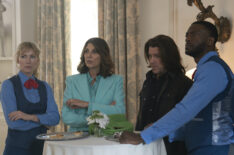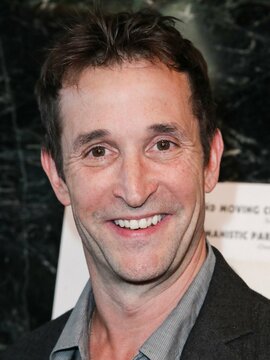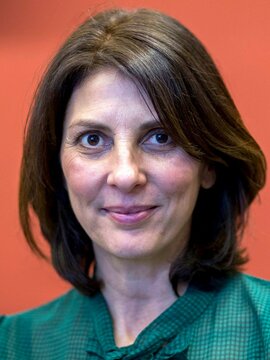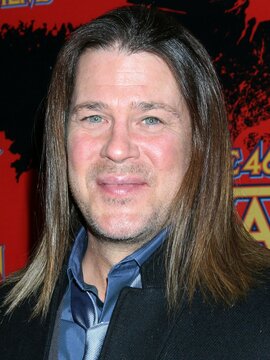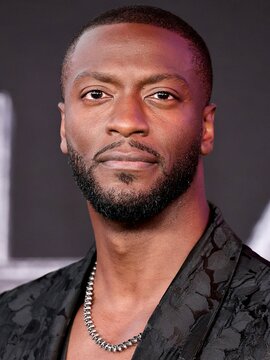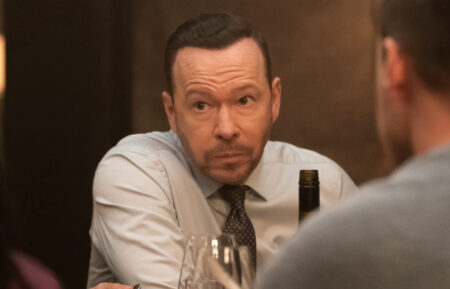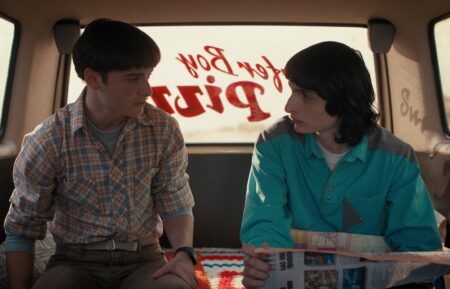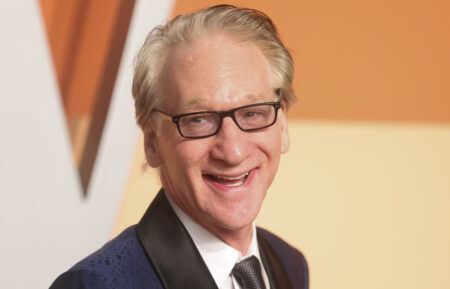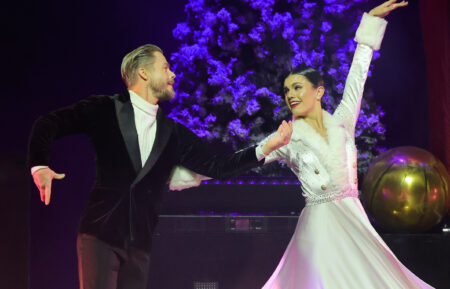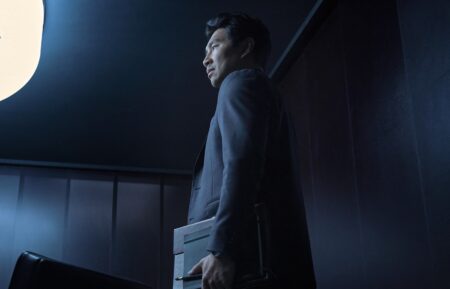‘Leverage: Redemption’ EPs on How Far Parker Would’ve Gone Without Eliot in Season 3 Finale
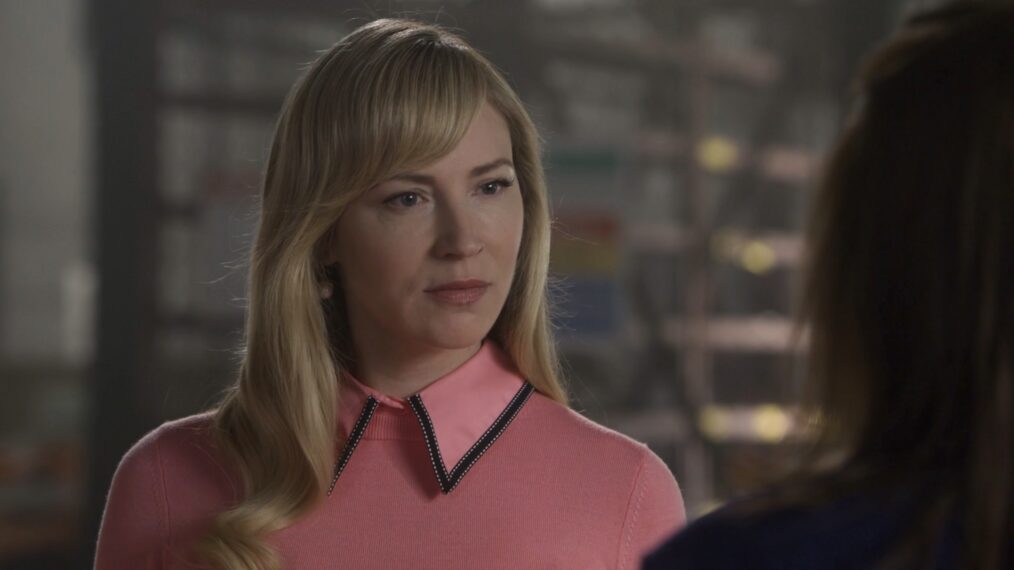
Spoiler Alert
[Warning: The below contains MAJOR spoilers for the Leverage: Redemption Season 3 finale “The Side Job.”]
Could Parker (Beth Riesgraf) actually kill a mark?! That’s the question the Leverage: Redemption Season 3 finale asks.
Parker runs a job herself, taking on a local factory kingpin (Ricardo Chavira) using child labor, and at one point, she threatens to throw him into a bone grinder. (Dark stuff!) It’s Eliot (Christian Kane) who finds her. He has her back, no matter what, he says, and yes, he tried to talk Nate out of killing the man who murdered his father, but he was an alcoholic who carried around Catholic guilt, hated himself for the death of his son, and wouldn’t have lasted a week after pulling the trigger. Their conversation then turns to the Season 4 premiere from the original run. Then, on a mountain, they’d talked about how they weren’t like the others. Sometimes, it’s on them to do certain things. Whatever choice she makes now, he has her back.
Parker doesn’t kill their mark, but instead sets him up to possibly follow a path of redemption. And that teaches her, as she tells the returning Hardison (Aldis Hodge), that the main reason to do things their way is it’s their way. She has a presentation. Hardison, who was off thinking about why and how they do crime, does not…
Below, showrunner John Rogers (who wrote the finale) and executive producer Marc Roskin (who directed it) break down the episode and discuss their hopes for a fourth season. (There’s no word yet from Prime Video about the show’s future.)
We get that great Parker and Eliot conversation that features the callback to “The Long Way Down Job.” How early in working on the finale had you realized you wanted to have that?
John Rogers: Script-wise, very early in the season. This season didn’t have a season-long villain. What we wanted to do was have a season-long theme and that was exploring how each one of these people approaches their position in life. You couldn’t have Parker sort of looking at why she does what she does without that emotional grounding moment. If Aldis, unfortunately because of his schedule, isn’t there, it has to be with Eliot, and we wanted to call back to that great moment between the two. They have a very specific unique insight into each other.
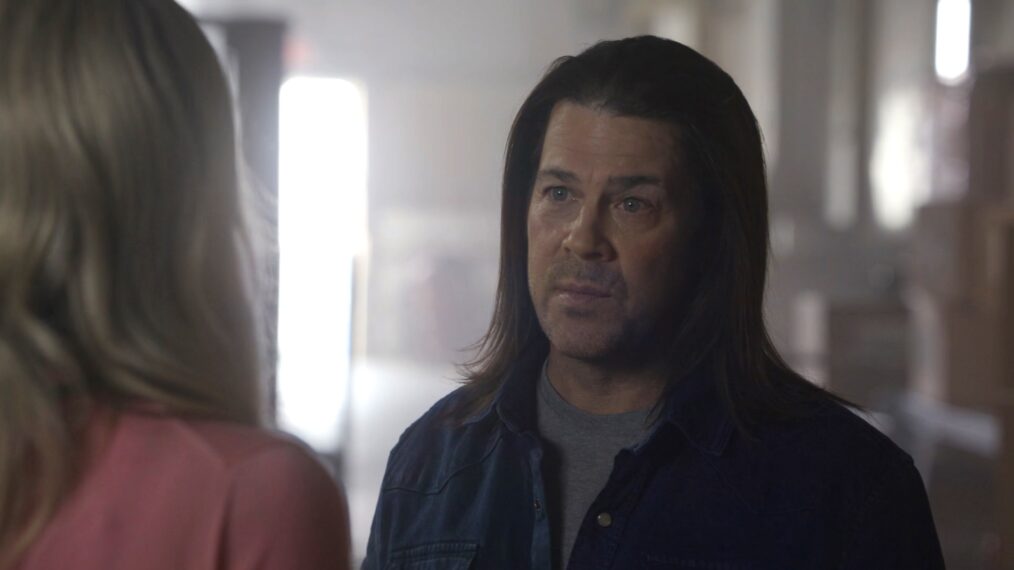
Prime Video
Parker says that she had to drive the con until Eliot stopped her to really sell it. And why was he able to — we’ve seen since the original Leverage, their relationship.
Rogers: I think that’s a really good question as to whether she was being completely honest with that statement. I think the fans should actually be able to interpret that in any way they want. But that’s the thing. When we did the original show, the thing that stopped Nate from killing was realizing the other people expected more and better of him, and this is a different situation in which Eliot is going, you know who you are. Killing changes who you are. So are you willing to make that change in your life and see yourself as a different person the way Eliot sees himself? Because Eliot has killed.
Marc, talk about directing that scene of Parker at the bone grinder, then the Parker and Eliot conversation.
Marc Roskin: Yeah, I mean it was heavy. I mean, filming in black and white and having her say that speech as she’s pushing our villain, played by Ricardo Chavira, up the plank and then suddenly it comes to a stop and then figuring out how to get to color. Probably one of the best scenes Beth’s done. It was so chilling and she’s actually pushing that guy up that ramp and it comes to a grinding halt. And then that moment between her and Christian, there were chills on the set.
Rogers: I think the important part — and just as a writer having a great director and somebody I’ve worked with and get to work with again in a few more weeks — in that scene could so easily be lost. And Marc picked it out is when Ricardo’s like, “Oh, you’re here to save me.” And Eliot goes, “Not so fast and nobody said that.” It’s a little throwaway line, but it’s not about you, it’s about her, and I’m here for her. Marc did a great job. We stood on the set, and I’m like, “I have no idea how to make this transition.” And Marc was the one who came up with, we’re going to physically move them away down back into this space. So that’s color. This is the black and white space up here. And I have to say, tossing a conceptual half black and white framework episode at most directors, they would curl into a ball, and Marc just absolutely killed it. Every black and white frame is beautiful. Every transition is flawless. The tone and style changes. He just knocked it out of the park.
Roskin: Beth also had to play someone who you really think is going to kill this person. But then of course it was all part of her con to get him away. Right, John?
Rogers: Yeah, no, absolutely. Look, I’m a big believer in the death of the author. You shouldn’t care what I think, honestly, as a viewer. You should be taking in and absorbing it as your own version of the episode. But I think she was kind of 50-50, like, “This could go either way. I’m really, really pushing myself to this point to find out what I believe.” Because that is something that we talk about, is she takes her cues from Hardison and Eliot so much. She is part of that relationship and sometimes we forget who we are. We don’t sit down and do the work about what we believe is right and wrong.
Roskin: And we got really lucky casting the right villain. Ricardo was just so great from day one and we actually shot the first scene of the episode on the first day, which is something you don’t normally get to do. They just figured each other out and every rhythm felt right when they’re pretending to like each other or when she’s pretending to like him. It makes everybody’s job easier when you get a guest star who can dance with the team. And Ricardo was one of those guys.
Rogers: That’s another credit to Marc because he was the one who had talked about Ricardo and I said, “I have a very difficult episode late in the season.” He said, “I’m holding him. I’ve got the guy for you.”
Because there are two episodes I’ve always wanted to do in the show because we go through the world telling ourselves stories. That’s how we make sense of the world. And what a good confidence game does is it tells you another story that you believe in. What a great confidence game does is gets you to tell a different story. So you are the one making up the story instead of the artist, and so you’re trapped in it and everything reinforces it. We did “The Belly of the Beast Job” last year where we saw what it’s like for a Leverage con from a bystander’s point of view.
And I’ve always had this challenge, I’d love to do an episode trapped in the bad guy’s point of view because they’re trapped in this fake story. What’s it like to be in this crazy world Leverage builds for you? But the problem is the villains are really unlikable human beings. They’re just monsters. I don’t want to spend 45 minutes with this monster. And so he had to find exactly the right actor who could be charming and likable even though you hate him. And Marc really just pulled him out of his pocket. He worked with him before. I don’t think the episode works without Ricardo, honestly. I think he’s fantastic.
Roskin: It was great for me. Also, the first Leverage episode I did had to do with Parker and children being abused, “The Stork Job.”
Rogers: You directed that. Holy smokes.
Roskin: Yeah, so that was the first episode I directed was Parker in that room full of orphans and that backstory and it all played in and you could feel it in the scenes and in the episode.
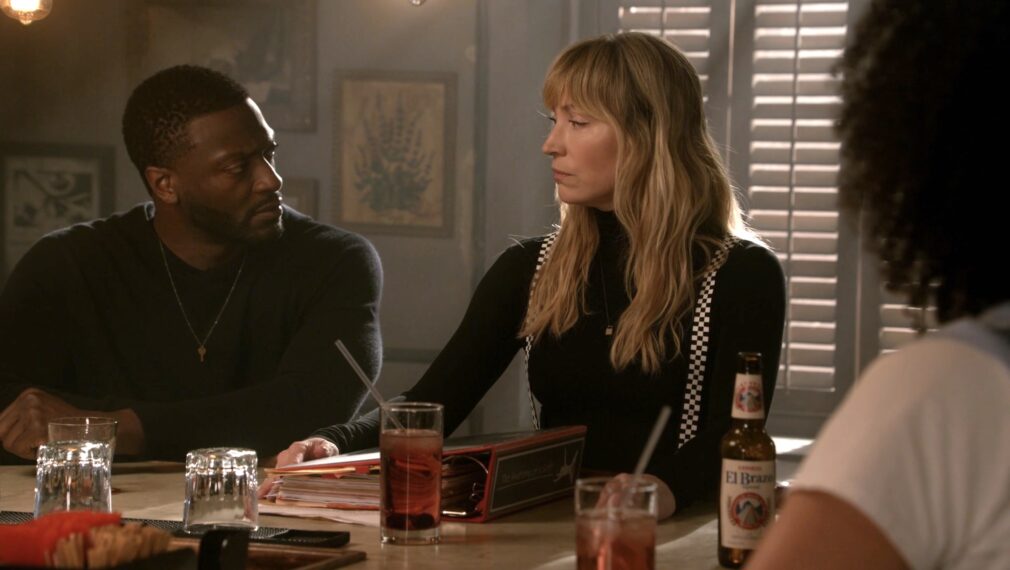
Prime Video
We don’t hear where Hardison stands at the end of the season after six months because he doesn’t have the presentation Parker wanted…
Rogers: It’s funny because he’s already made his decision. He was completely unaware that she had turned this into a project in the way that all long-standing relationship sometimes — certainly I’ve been married 33 years and my wife says something, “We’re going to do X,” and I go, “We agreed to that? I don’t remember that.” But he stated it earlier, which is, look, Eliot does it for redemption. Hardison does it because he wants to affect some big change. He wants to make a change in the world to the better. And what he’s realizing is he wants to do it in a more systemic matter and Parker is coming at change because she’s kind of a virtue ethics person, like, look, we should all be the best version of ourselves we can be. And for us that’s kindness and the way we exhibit kindness is through crime. Trying to live by other people’s rules is nuts. The best way we help other people is by being criminals. So let’s just do that and not worry so much. There is a much longer, drier discussion of the different models of morality and ethics that was originally in the speech that the writers’ room convinced me to take out because no cared about it but me.
Sophie’s (Gina Bellman) still dating Jack (John Charles Meyer) at the end. What is it about that relationship that seems to be working or is at least what she needs right now?
Rogers: It’s low pressure, honestly. And Noah [Wyle]’s performance as Harry Wilson is fantastic and there’s zero romance in the relationship between Sophie and Harry Wilson, but Sophie spends a lot of time with broken people and being their anchor. And Jack’s just good at everything. And sometimes it’s just nice to be with somebody that you don’t have to worry about their emotional state or whether they’re going to suddenly have a criminal who they wronged from 20 years ago drop out of the sky and try to ruin all your lives. After the relationship with Nate, which was the most intense, most emotionally fraught relationship of her life, is it going to last with Jack? But he respects her. He cares for her. He treats her well. He’s interested in the same thing she is. We should all be so lucky.
When you’re looking ahead at a possible fourth season, how much would Aldis and Noah be in it? Aldis’ schedule has been part of it since the beginning, and now you have The Pitt for Noah.
Rogers: There’s an old saying, the past you can’t change is depression and the future you have no control over is anxiety. So I do not in any way, shape, or form think about — I’d love a fourth season, but I don’t think about it. We don’t plan it. Look, we didn’t anticipate Noah getting The Pitt, and we very specifically had to shoot around his absences to prep for that and we did it and it was successful, but I think anybody plays chess with the future is a fool.
Roskin: Listen, if we got a Season 4 and we had the opportunity to have them back for a lot or a little, it’s great.
Rogers: Whatever we can get of either of those really great actors is candy.
I loved having Hurley (Drew Powell) back because I love the way that you’re exploring him going from mark to now part of Leverage International. When did you come up with wanting to explore what you do with him this season?
Rogers: It’s interesting because that was Chris. Chris Downey has always had a real fondness for both the character and the actor. Actually, Drew and I walked on the strike lines together. He was up at Warner Bros. with me. So we got to hang out and just remind me like, “Oh, that’s right, he’s great. We love him. We should bring him back.” But that was actually well before the season started, Chris sort of came in with, “I want to do a Hurley episode. This is the arc I want to explore. I want to show him completing his arc,” because we never really completed it in Chris’s head of, by healing someone else, he finishes his own healing process.
Who would you both like to bring back or introduce in the future?
Roskin: It’s always great to have Drew come back. He just brings such an energy when you get to work.
Rogers: Yeah, Everyone’s just happy on set when he is around. Everyone’s having a good time. … I think there’s a couple. It’s so interesting because Maggie [Kari Matchett] or Sterling [Mark Sheppard], I’d love to bring because I would love to explore how their relationship with Sophie changed after Nate’s death over that or even how they — we established Maggie and Sophie had become friends by the end of the first show, but probably friends to the level which made Nate uncomfortable. So I mean they’ve stayed friends and it would be interesting to see if we get Maggie back.
The fans always want Nana. My problem is I don’t think we can ever meet Nana. I don’t think there’s an actor that we can actually cast that will ever be as awesome as Nana — Hardison’s Nana, Parker’s Nana by this point, and Eliot’s Nana, whether he admits it or not — is.
If I’m going to say one person from this season, I’d bring back Ivy. There was just such electric chemistry between she and Christian in that scene in “The Scared Stiff Job.” And we really liked her as an actor and we had kind of like, “Oh, shoot, that’s chemistry. We should have her back.” And then she’s a New York based actor and we couldn’t get her.
Roskin: And I know the storyline probably wouldn’t have someone like him come back, but our first villain of the season that you wrote, and I directed, Jack Coleman.
Rogers: He’s so good. Oh man, was he good.
Roskin: Yeah. Even Gina was like, “Whoa. This guy’s on a different level.”
Rogers: He had to play one of the hardest villains we do, which is the banality of evil villain. He honestly has no idea he’s a monster. There are people who self-justify, “Well, I’m the good guy.” Arizona Mike just goes through life believing he’s making a living and just sometimes millions of people get hurt. But that’s kind of the challenge of the show, and that’s why Drew Powell is such a rare bird. All our villains have to be bad enough that you don’t feel bad about us ruining their lives, so we can’t ever bring them back. They have to play monsters. And so bringing ’em back is always tricky, and if we bring ’em back because we didn’t beat ’em, then we failed in the first episode. So we’re kind of a trap. Ricardo was one of my favorite actors to work with in my career and we could never bring him back.
Is there anything you can share about what we could see in a fourth season?
Rogers: We have to keep making the show because bad things keep happening. When we came back for the reboot, we were like, well, we’re going to get stories. And then all the horrible stories just rained out of the sky and they do every year. I think if you had a fourth season, you would see a lot more about the sort of AI tech — the environmental damage that industrial AI does. I always research just in case about these small towns that have these giant bitcoin and AI factories built in them and the sound and the noise and the power draws destroying these people’s lives.
We’ll talk a lot about power. I think we can only drift more and more into the same direction we’re going this year, which is just because something’s legal doesn’t make it good and something’s illegal doesn’t make it bad. That’s a system the world puts on things and we have to treat people like people on an individual basis and not rely on the structures that we believe are there to protect us. It’s not full-blown 17th century anarchism, but it’s getting there.
Leverage: Redemption, Streaming Now, Prime Video

